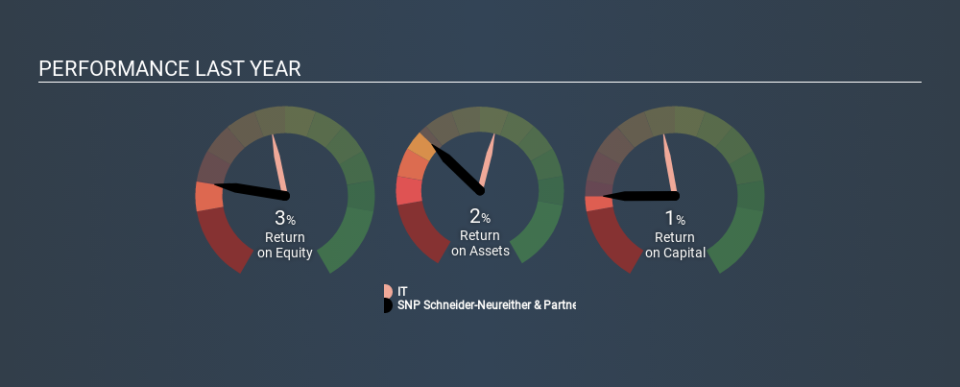Is SNP Schneider-Neureither & Partner SE's (ETR:SHF) 3.1% ROE Worse Than Average?

Many investors are still learning about the various metrics that can be useful when analysing a stock. This article is for those who would like to learn about Return On Equity (ROE). By way of learning-by-doing, we'll look at ROE to gain a better understanding of SNP Schneider-Neureither & Partner SE (ETR:SHF).
Over the last twelve months SNP Schneider-Neureither & Partner has recorded a ROE of 3.1%. One way to conceptualize this, is that for each €1 of shareholders' equity it has, the company made €0.03 in profit.
View our latest analysis for SNP Schneider-Neureither & Partner
How Do You Calculate ROE?
The formula for return on equity is:
Return on Equity = Net Profit (from continuing operations) ÷ Shareholders' Equity
Or for SNP Schneider-Neureither & Partner:
3.1% = €2.1m ÷ €69m (Based on the trailing twelve months to September 2019.)
Most know that net profit is the total earnings after all expenses, but the concept of shareholders' equity is a little more complicated. It is all the money paid into the company from shareholders, plus any earnings retained. You can calculate shareholders' equity by subtracting the company's total liabilities from its total assets.
What Does Return On Equity Mean?
Return on Equity measures a company's profitability against the profit it has kept for the business (plus any capital injections). The 'return' is the profit over the last twelve months. That means that the higher the ROE, the more profitable the company is. So, as a general rule, a high ROE is a good thing. That means it can be interesting to compare the ROE of different companies.
Does SNP Schneider-Neureither & Partner Have A Good Return On Equity?
One simple way to determine if a company has a good return on equity is to compare it to the average for its industry. However, this method is only useful as a rough check, because companies do differ quite a bit within the same industry classification. As is clear from the image below, SNP Schneider-Neureither & Partner has a lower ROE than the average (14%) in the IT industry.
That certainly isn't ideal. We prefer it when the ROE of a company is above the industry average, but it's not the be-all and end-all if it is lower. Still, shareholders might want to check if insiders have been selling.
How Does Debt Impact ROE?
Virtually all companies need money to invest in the business, to grow profits. The cash for investment can come from prior year profits (retained earnings), issuing new shares, or borrowing. In the case of the first and second options, the ROE will reflect this use of cash, for growth. In the latter case, the use of debt will improve the returns, but will not change the equity. That will make the ROE look better than if no debt was used.
SNP Schneider-Neureither & Partner's Debt And Its 3.1% ROE
Shareholders will be pleased to learn that SNP Schneider-Neureither & Partner has not one iota of net debt! Even though I don't think its ROE is that great, I think it's very respectable when you consider it has no debt. After all, when a company has a strong balance sheet, it can often find ways to invest in growth, even if it takes some time.
In Summary
Return on equity is useful for comparing the quality of different businesses. A company that can achieve a high return on equity without debt could be considered a high quality business. All else being equal, a higher ROE is better.
But when a business is high quality, the market often bids it up to a price that reflects this. The rate at which profits are likely to grow, relative to the expectations of profit growth reflected in the current price, must be considered, too. So I think it may be worth checking this free report on analyst forecasts for the company.
Of course, you might find a fantastic investment by looking elsewhere. So take a peek at this free list of interesting companies.
If you spot an error that warrants correction, please contact the editor at editorial-team@simplywallst.com. This article by Simply Wall St is general in nature. It does not constitute a recommendation to buy or sell any stock, and does not take account of your objectives, or your financial situation. Simply Wall St has no position in the stocks mentioned.
We aim to bring you long-term focused research analysis driven by fundamental data. Note that our analysis may not factor in the latest price-sensitive company announcements or qualitative material. Thank you for reading.

